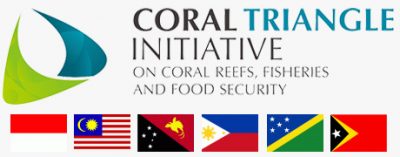NOAA/Connecticut Sea Grant/Coral Triangle Support Partnership/USAID Partnerships in the Coral Triangle
 The Coral Triangle Initiative on Coral Reefs, Fisheries, and Food Security (CTI-CFF) is a multilateral partnership of six countries working together to sustain extraordinary marine and coastal resources by addressing crucial issues such as food security, climate change and marine biodiversity. Connecticut Sea Grant staff (Robert Pomeroy) has been working with NOAA staff for the last four years on the U.S. Coral Triangle Initiative.
The Coral Triangle Initiative on Coral Reefs, Fisheries, and Food Security (CTI-CFF) is a multilateral partnership of six countries working together to sustain extraordinary marine and coastal resources by addressing crucial issues such as food security, climate change and marine biodiversity. Connecticut Sea Grant staff (Robert Pomeroy) has been working with NOAA staff for the last four years on the U.S. Coral Triangle Initiative.
- What is NOAA’s role? NOAA is an implementing partner in the regional US CTI Support Program and two bilateral programs in Indonesia and in Timor-Leste. NOAA works with NGOs, local governments, and regional institutions in combating illegal, unreported, and unregulated fishing (IUU), enhancing in policy and practice MPA management, ecosystem approaches to fisheries management, and climate change adaptation. NOAA works from the local to national to multinational scales.
- Significance of the Coral Triangle Initiative on Coral Reefs, Fisheries, and Food Security (CTI-CFF): Led by Indonesian President SBY in 2009, the CTI-CFF is a regional ocean governance initiative considered the broadest endeavor in ROG and ecosystem based management to date. The USG has invested significant financial and political resources in supporting the CTI, including $60M in regional and bilateral support programs in the region.
- Significance of USG Engagement in Coral Triangle: The Coral Triangle is the global epicenter of marine biological diversity, shared within the waters of six countries significant to US diplomatic and development policies: Indonesia, Malaysia, the Philippines, Papua New Guinea, Solomon Islands, and Timor-Leste. One in three people of the region’s 363 million rely upon coastal fisheries for food each day.
- What is Connecticut Sea Grant’s (CTSG) role? Staff of CTSG has been working under contract to the Coral Triangle Support Partnership, and in partnership with NOAA, to develop and implement programs on an ecosystem approach to fisheries management (EAFM) at regional, national and local scales.
- Benefits to date of NOAA and CTSG Engagement in USAID Partnerships in the Coral Triangle: These programs benefit USG interests, NOAA and CTSG missions, international relations, and ocean and coasts and the services they provide to society:
- Provides technical assistance and capacity building in ecosystem-based management policy and practice, including climate change adaptation, marine protected areas, and ecosystem approaches to fisheries management.
- Generates innovation and peer-to-peer exchange from which NOAA, CTSG and partners have developed tools new to the field of practice of ecosystem-based management.
- Targeted as significant international programs in the NOAA NGSP Implementation Plans, NOAA AGM and CTSG strategic plan.
- Enhances management of coral reef and coastal ecosystems in the epicenter of marine biological diversity.
- Resulted in innovation in MPA management, geospatial planning, ecosystem approaches to fisheries management, and climate change adaptation – all tools and methods applicable to U.S. domestic jurisdictions.
NOAA and CTSG international engagement in the Coral Triangle Initiative has led to:
- Efficiency – a little NOAA and CTSG time leveraged with significant USAID financial resources has led towards programs directly leading to innovation, peer learning, conservation of fishery resources and globally significant marine biodiversity.
- Innovation – in ecosystem based management and EAFM in policy and practice from local to national to multinational scales.
- US domestic mandates – Magnuson Stevens Fishery Conservation and Management Act (fisheries observer program development; building capacity in EAFM; and in combating illegal, unreported and unregulated (IUU) in at-risk IUU states); and Coral Reef Conservation Act (enhance global leadership in coral reef ecosystem conservation)
- Significance – to global ocean/coastal/fisheries resource management through improved conservation of Asia/Pacific fisheries resources for US, Asia/Pacific and global food security, livelihoods, income, trade and maritime security.
For more information, visit http://www.coraltriangleinitiative.org.